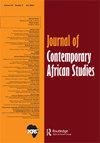理解2021斯威士兰学校抗议活动:一位教育家的理论思考
IF 0.8
Q2 AREA STUDIES
引用次数: 0
摘要
摘要2021年9月和10月,斯威士兰发生了该国历史上前所未有的学校示威活动。本文借鉴社会情感发展框架和挫折攻击理论,提出了一位教育家对这些事件的理论思考。它探讨了示威活动不仅仅是目前席卷全国的普遍政治骚乱的反映的可能性。相反,它们进一步暴露了该国政治和教育系统的根本缺陷。文章利用个人观察、当代新闻报道和广泛的文献综述,探讨了在学校中看到的暴力行为可能既是一种沟通策略,也是由疫情的直接和间接教育后果引起的负面情绪的表达,并进一步受到主流政治制度和政府未能满足学生需求的驱动。在此基础上,文章提出了教育工作者和政策制定者可以用来解决学生社会情感需求的策略,从而避免未来的情绪爆发和暴力行为。本文章由计算机程序翻译,如有差异,请以英文原文为准。
Understanding the 2021 eSwatini school protests: theoretical reflections of an educator
ABSTRACT During September and October 2021, eSwatini experienced school demonstrations unprecedented in the country's history. Drawing on a socio-emotional development framework and frustration-aggression theory, the article presents an educator's theoretically informed reflections on these events. It explores the possibility that the demonstrations are not simply a reflection of the prevalent political riots presently sweeping the country. Rather, they further expose the fundamental deficiencies in the country's political and education system. Utilising personal observations, contemporary news reports and an extensive literature review, the article explores the possibility that the violence seen in schools can be both a communicative strategy and an expression of negative emotions arising from both direct and indirect educational consequences of the pandemic, and further driven by the prevailing political system and the government's failure to meet students' needs. Building on this, the article suggests strategies that educators and policymakers could employ to address students' socio-emotional needs, thereby averting future emotional eruptions and violent behaviours.
求助全文
通过发布文献求助,成功后即可免费获取论文全文。
去求助
来源期刊

Journal of Contemporary African Studies
AREA STUDIES-
CiteScore
2.20
自引率
0.00%
发文量
18
期刊介绍:
Journal of Contemporary African Studies (JCAS) is an interdisciplinary journal seeking to promote an African-centred scholarly understanding of societies on the continent and their location within the global political economy. Its scope extends across a wide range of social science and humanities disciplines with topics covered including, but not limited to, culture, development, education, environmental questions, gender, government, labour, land, leadership, political economy politics, social movements, sociology of knowledge and welfare. JCAS welcomes contributions reviewing general trends in the academic literature with a specific focus on debates and developments in Africa as part of a broader aim of contributing towards the development of viable communities of African scholarship. The journal publishes original research articles, book reviews, notes from the field, debates, research reports and occasional review essays. It also publishes special issues and welcomes proposals for new topics. JCAS is published four times a year, in January, April, July and October.
 求助内容:
求助内容: 应助结果提醒方式:
应助结果提醒方式:


